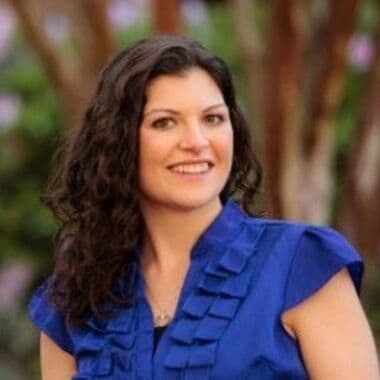Elena Dowin Kennedy
Greater Delta: Mississippi & Arkansas '09
Elena's corps experience broadened her perspective on systemic inequity, which now infuses her work in higher education.
Q&A
How do you stay engaged with the TFA alumni community?
As an alumna, it is essential to remain active in the movement for educational equity.
It was an incredibly hard decision to leave my placement region because I felt our work there wasn't done. When I moved from the Delta to Rhode Island, I learned there was a need there too, and I could offer value to the school system—even though I wasn't working in the district.
My experience was very different from that of CMs working in urban schools. I also found a group of people passionate about similar issues and built relationships I value, through TFA and Leadership for Educational Equity (LEE).
How has your corps experience shaped you?
I don't know who I would be or what I would be doing professionally without my corps experience. I lived a very insulated life before TFA and my students opened my eyes to systemic inequities I didn't see.
My time in the classroom was very challenging and rewarding. My students pushed me to examine my assumptions, be more articulate, and think carefully about my role in building culture and accountability both in the classroom and in society.
I ultimately decided to go to graduate school to study organizational theory because of my experience with two different principals with very different leadership styles and levels of success. I did my dissertation research examining how organizational structure affects the impact of social enterprises.
What are you doing now?
I now teach social entrepreneurship and strategy in a business school. My experience with TFA changed the way I teach at the college level. Most of my current students come from significantly more privileged positions than the students in my TFA placement school. Part of my job is opening their eyes to the inequities that I was blind to when I was in college. I challenge my students to utilize their business school education to make meaningful change in their companies and communities.
Why is it important to keep equity as the focus of your career?
My experience taught me to see inequality more clearly. It is my responsibility to help others do the same. Without equity, we as a society are hurting ourselves and our children.
What was the biggest lesson that your corps experience taught you?
Asset-based thinking. This means looking at someone's actions and starting from a place of generosity—trying to understand the best possible motivation for their action. Beginning a conversation or an intervention assuming the best expands the potential for a successful and meaningful interaction and increases the likelihood of a successful outcome. It's hard and I'm not always good at it, but taking a moment to step back and reflect with this mindset is one of my most valuable lessons from my TFA experience.



